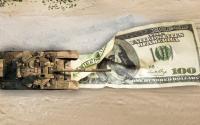William Safire
WASHINGTON — An alliance with a price tag is no alliance at all.
I like the Turks. They shared our human sacrifice in the Korean War, were a NATO bastion against the Soviet Union in the cold war, and provided all we asked for in gulf war I. In recent years, the "secret alliance" — quiet military cooperation among the Turks, Israelis and Americans — has been one of the few forces for stability in the Middle East.
That history of reliable alliance is the basis for longtime American support of Turkey's interests. This has ranged from influencing the International Monetary Fund to bolster its economy to urging the anti-Muslim European Union to admit this model of a secular Muslim democratic state.
Paradoxically, the growth of democracy in Turkey — which America cheers — has introduced an element of uncertainty in that alliance. The new, freely elected government in Ankara, with roots more Islamic than secular, is waffling about joining President Bush's "coalition of the willing" against Iraq. The old Turkish power structure — the nation's military leadership and governmental establishment, which previously called the shots — is laying back to show Europeans how sensitive to public opinion Turkey has become.
That public opinion is neither as pro-Saddam nor anti-U.S. as recent polls report it to be. When asked, "Are you for war?" of course the answer 9 times out of 10 will be "No," but if asked, "Are you for the overthrow of Saddam?" Turkish friends tell me the answer would be much more sharply divided.
New officials in Turkey's leading party, which controls two-thirds of Parliament, are doing nothing to prepare the public for the necessity of deposing Saddam. Instead, the temporary prime minister, Abdullah Gul, has been racing around to Arab capitals to show how eager he is for a way out of siding with the U.S.; he rejects cooperation with any allied attack without another this-time-we-mean-it U.N. resolution. A large delegation of Turkish businessmen just visited Baghdad.
Such failure to rally the Turkish voters' support for Turkey's long-range best interest in ending the tyranny oppressing its neighbor was Mistake No. 1. Worse than that is the mistake its Justice and Development Party is now making, which threatens to damage the valuable Turkish-American alliance: to seem to attach a price tag to taking part in our liberation of the Iraqi people.
When the U.S. asked for permission, as required by Turkey's Constitution, to use bases in Turkey from which to stage an invasion, dickering began over how many hundreds of millions of dollars would be provided to upgrade the bases and lengthen landing fields. While this dragged on with no concrete being poured, an economic aid package was sought that Ankara estimates at $5 billion and U.S. sources say is more than double that.
If the Turkish economy, already in deep trouble, takes a hit in the coming war, our ally could legitimately turn to the U.S. as well as to New Iraq's oil resources for recompense. And surely Ankara should make the Turkish public aware of America's interest in cushioning any shock to its major local ally. But the unseemly hard bargaining going on now over money for military assistance is demeaning and could change the nature of the two nations' alliance.
What should Turkey's new leaders do? First, make prompt parliamentary and construction arrangements to welcome the U.S. troops. And then go the extra mile: Volunteer to mass 100,000 Turkish troops on its border with northern Iraq. (When it did this with Syria, which had provided the base for the harassment of Turkey by P.K.K. terrorists, the Syrian dictator got the message and booted the terrorist leader out of Damascus, which led to his capture.)
The real threat of a Turkish Army descending on Baghdad from the north would hasten the surrender of Iraqi generals facing an American army rolling up from Kuwait in the south.
It may be that we would decline a Turkish offer to join the allied invasion, lest the Turks be reluctant to leave oil-rich Kirkuk. But if Turkey acted like a strategic ally rather than a nervous renter of bases, it would have an unwavering superpower on its side for decades to come.





